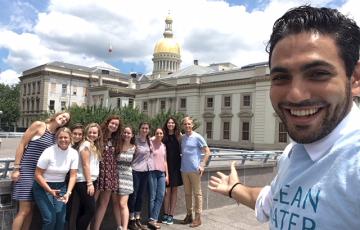publications
Comments on Definition of “Waters of the United States”
On behalf of the undersigned 187 organizations and our millions of members and supporters across the country, we oppose the Trump administration’s attempt to repeal the 2015 Clean Water Rule and urge the U.S. Environmental Protection Agency and U.S. Army Corps of Engineers to withdraw this proposed repeal.
publications
New Jersey Currents - Summer 2018
In This Issue: Trenton Roundup: Nuke Bailout, DuPont Toxic Waste, Fracking and Plastic Bag Bans | Farewell, Poseidon | Helping Elect Pro-Environment Candidates to Congress | Upcoming Clean Water Action Events | No More Plastic Straws | Environmental Justice Updates from Newark to the Statehouse
publications
California Currents | June 2018
In This Issue: ReThink Disposable is Unpackaging an Island | Subsistence Fishing in the Bay: Why the Beneficial Use Designation Matters | Support Safe and Affordable Drinking Water for All Californians | Clean Water Action Racial Justice Coordinator Co-Teaches East Oakland Civic Engagement Class | Protecting Your Food—and Your Right to Know | Use of Oil Wastewater to Irrigate Crops More Alarming | Members of the California Office Attend Crossroads Antiracism Training | Dan Howells Joins California Staff as New State Director | New Communications Manager in the California Office
publications
Minnesota Currents | June 2018
In This Issue: Let's Protect Groundwater | Disappointment in the Legislative Session | Great Lakes Day | Victory at Lowe's | How to Conserve Water This Summer | Water Action Day 2018
publications
New England Currents | Spring-Summer 2018
In This Issue: Big Victory at Lowe's Hardware | Moms Speak Out | Zero Waste Boston Update | Fighting Fracking from PA to MA | Massachusetts Youth Advisory Board | Welcome Marisol, Vick, Laura, and Blake | Biomass Victory in Rhode Island | In Memoriam: Dave Gerraughty | Fighting for a Sustainable Water Plan in Connecticut | 2018 Connecticut Energy Bill Update | Connecticut Youth Lobby Day
Stay Informed
Get the latest updates and actions:
Thanks for signing up!
There was a problem processing your signup. Please try again.



